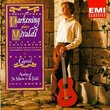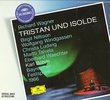| All Artists: Hector Berlioz, Seiji Ozawa, Boston Symphony Orchestra, Vinson Cole, Tanglewood Festival Chorus Title: Berlioz: Requiem Members Wishing: 0 Total Copies: 0 Label: RCA Release Date: 11/8/1994 Genre: Classical Styles: Opera & Classical Vocal, Historical Periods, Classical (c.1770-1830), Early Music Number of Discs: 1 SwapaCD Credits: 1 UPC: 090266254422 |
Search - Hector Berlioz, Seiji Ozawa, Boston Symphony Orchestra :: Berlioz: Requiem
 | Hector Berlioz, Seiji Ozawa, Boston Symphony Orchestra Berlioz: Requiem Genre: Classical
|
Larger Image |
CD DetailsSimilar CDsSimilarly Requested CDs
|
CD ReviewsGreat performance of a difficult work madamemusico | Cincinnati, Ohio USA | 07/13/2002 (5 out of 5 stars) "The Berlioz Requiem has assumed a semi-legendary quality in live performance, particularly because of the composer's 3-D sound achieved by placing four brass choirs in different places, and having the tenor sing the "Sanctus" from high up and back of the audience. These effects are extremely difficult to capture on a recording, and in addition to this very few recorded performances have the impassioned, almost manic quality that makes Berlioz' music so wonderful.I loved the old Charles Munch recording for Munch's white-hot passion and the lustrous singing of tenor Leopold Simoneau, but the NE Conservatory Chorus was quite ragged and not worthy of the music. The Robert Shaw recording had a great orchestra and chorus, and a decent tenor, but somehow lacked intensity. The mid-1970s Bernstein recording, made in quadraphonic and with the superb tenor Stuart Burrows, suffered from Bernstein's usual quirky tempi and distended phrases.Seiji Ozawa, a conductor I normally don't like very much, has the knack of conducting Berlioz extremely well. I still recall his PBS radio broadcast of the Symphonie Fantastique and Lelio (I think from the early 1980s) that left me spellbound: a shame he never recorded "Lelio" commercially. Here, however, we have a near-flawless performance of the Requiem, with all elegance and passion intact. The orchestra and chorus respond splendidly, and tenor Vinson Cole sings quite beautifully in the "Sanctus". (I'm not quite sure what "A music fan from Iowa City" is complaining about in regards to Cole's singing; like most tenors, he employs a little portamento, perfectly acceptable musically, and his phrasing is both beautiful and haunting.) If you are a Berlioz fan but have resisted buying a copy of the "Requiem" until now, I heartily recommend this version." I prefer Ozawa's Requiem to Shaw's madamemusico | 04/30/2001 (5 out of 5 stars) "I know that Robert Shaw's Telarc recording of this piece is supposed to be top-dollar, and indeed, it is very well-polished, but this version is still my favorite. The Tanglewood Festival Chorus is everywhere as well-trained and refined as Shaw's, and in many places, more crisp. The RCA engineers do a suberb job at recreating the stereophonic experience of the four brass choirs, which, I must say, are quite precise in their rhythms. Finally, with no disrespect to the Atlanta Symphony Orchestra, the Boston ensemble is simply more experienced; therefore, their color is more impressive. I just finished a weekend of performances of this work with Pierre Boulez and the Cleveland Orchestra, so I know how demanding (and rewarding, for that matter) the choral parts are. I am more and more impressed by the Tanglewood Chorus with each listening." Uninspired rendition of a masterwork madamemusico | 04/08/2000 (3 out of 5 stars) "For the most part, this recording of the famed Berlioz Requiem is very good. In some places, I feel as though Maestro Ozawa is pushing the tempo, making this great piece lose some of its strength. One place in particular is in the Tuba Mirum movement. The tempo is simply too fast, and the timpani chorus does not come through very well on this recording. What is usually the high point of the Requiem is not in this recording. I do love the interpretation of the Sanctus movement, the tenor soloist and chorus do a splendid job of interpreting this gorgeous part of the music."
|

 Track Listings (10) - Disc #1
Track Listings (10) - Disc #1









![Franz Lehar: The Land of Smiles / Gustafson, Hadley, Itami, Atkinson; Bonynge [in English]](https://nationalbookswap.com/cd//m/22/6122/6006122.jpg)
